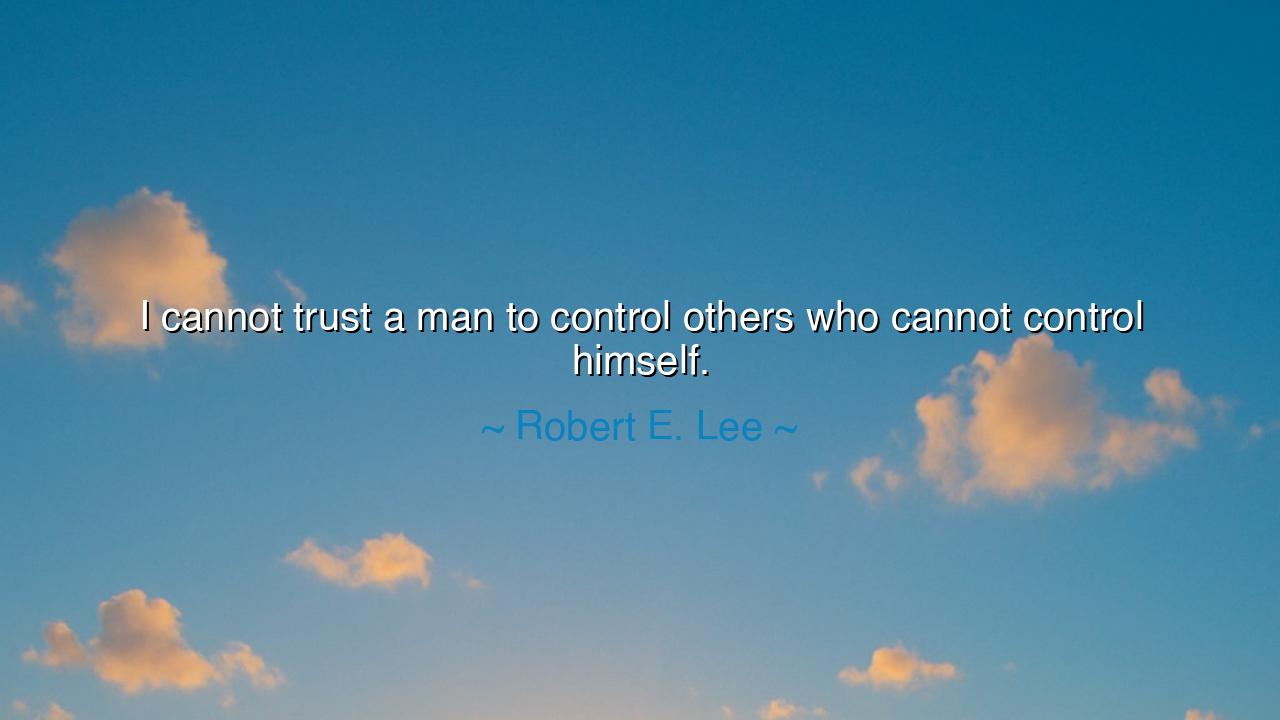
I cannot trust a man to control others who cannot control






Robert E. Lee, soldier of renown and figure of tragic history, once declared with iron clarity: “I cannot trust a man to control others who cannot control himself.” In these words we hear a truth older than kings and generals, a truth carved into the very laws of leadership: that mastery of the self is the first and greatest qualification for mastery of others. For the leader who cannot govern his own passions, appetites, and tempers will rule not with justice, but with chaos.
The ancients knew this well. Plato taught in The Republic that the just city must be ruled by the philosopher-king, not because of birthright or wealth, but because he had first conquered himself — his greed, his anger, his lust for power. The Stoics, too, declared that self-mastery is the highest victory, greater even than victory in battle. For how can a man restrain the multitude if he is himself enslaved by pride or rage? Thus Lee’s words, though spoken in the 19th century, carry the weight of wisdom echoed since antiquity: the foundation of all governance is self-control.
History bears witness to this lesson again and again. Think of Alexander the Great, whose armies swept across continents. His brilliance as a commander was unmatched, yet his inability to control himself — his drinking, his anger, his reckless impulses — sowed discord and destruction among his men. In one drunken fury he slew his dearest companion, Cleitus, and though he wept afterward, the stain remained. Here was a man who controlled millions, yet could not master his own passions. His empire, like his temper, burned bright but quickly crumbled.
By contrast, consider George Washington, who in the American Revolution and in the founding of his nation showed extraordinary self-control. Offered the crown of a new monarchy, he refused it. Tempted with power, he stepped away after two terms as president. His restraint became his greatest strength, teaching his people that true leadership is not the indulgence of desire but the discipline of character. Because he mastered himself, he could be trusted to guide others. His legacy endures not because of conquest, but because of self-mastery.
Children of tomorrow, hear this: leadership is not first about commanding armies, nations, or companies. It is about commanding the self. If you cannot bridle your tongue, how will you speak wisely to those who follow you? If you cannot govern your anger, how will you bring peace to others? If you cannot restrain your greed, how will you deal justly with the weak? To lead without self-control is to wield a sword with no hilt — sooner or later, it will cut the hand that holds it.
The lesson is clear: before seeking to rule others, seek to rule yourself. Cultivate patience, discipline, humility, and courage. When trials come, let not your temper rule you. When temptations rise, let not your appetites enslave you. Build your character as a fortress, and then, and only then, will others be safe under your command. For the people do not need a tyrant who is ruled by passions, but a leader who has become master of his own soul.
Practical actions flow from this wisdom: practice silence when anger flares, so that your words do not wound. Train your body and mind with discipline, so that your desires do not dictate your choices. Examine yourself daily, asking: Am I fit to lead, not because of what I demand from others, but because of what I demand from myself? In this way, you will forge a strength greater than armies — the strength of self-mastery.
So let it be remembered: “I cannot trust a man to control others who cannot control himself.” To master oneself is to wield the true scepter of authority. And the one who achieves this becomes not only a leader of men, but a guide to generations, leaving behind a legacy not of domination, but of wisdom, justice, and enduring respect.






AAdministratorAdministrator
Welcome, honored guests. Please leave a comment, we will respond soon